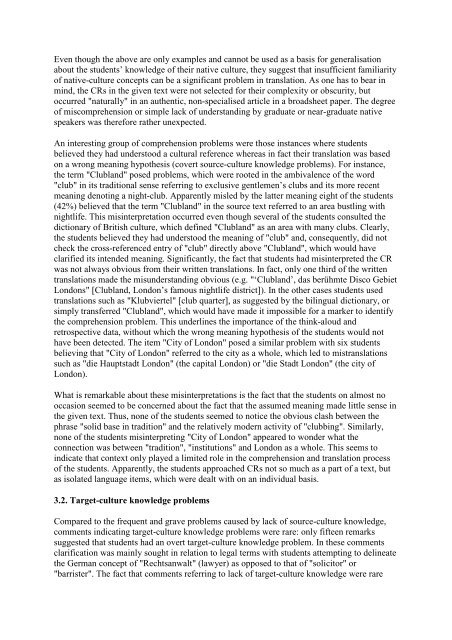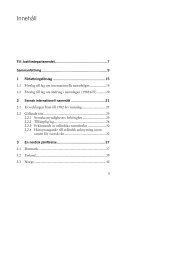Translation, Cultural Knowledge and Intercultural Competence
Translation, Cultural Knowledge and Intercultural Competence
Translation, Cultural Knowledge and Intercultural Competence
Create successful ePaper yourself
Turn your PDF publications into a flip-book with our unique Google optimized e-Paper software.
Even though the above are only examples <strong>and</strong> cannot be used as a basis for generalisationabout the students’ knowledge of their native culture, they suggest that insufficient familiarityof native-culture concepts can be a significant problem in translation. As one has to bear inmind, the CRs in the given text were not selected for their complexity or obscurity, butoccurred "naturally" in an authentic, non-specialised article in a broadsheet paper. The degreeof miscomprehension or simple lack of underst<strong>and</strong>ing by graduate or near-graduate nativespeakers was therefore rather unexpected.An interesting group of comprehension problems were those instances where studentsbelieved they had understood a cultural reference whereas in fact their translation was basedon a wrong meaning hypothesis (covert source-culture knowledge problems). For instance,the term "Clubl<strong>and</strong>" posed problems, which were rooted in the ambivalence of the word"club" in its traditional sense referring to exclusive gentlemen’s clubs <strong>and</strong> its more recentmeaning denoting a night-club. Apparently misled by the latter meaning eight of the students(42%) believed that the term "Clubl<strong>and</strong>" in the source text referred to an area bustling withnightlife. This misinterpretation occurred even though several of the students consulted thedictionary of British culture, which defined "Clubl<strong>and</strong>" as an area with many clubs. Clearly,the students believed they had understood the meaning of "club" <strong>and</strong>, consequently, did notcheck the cross-referenced entry of "club" directly above "Clubl<strong>and</strong>", which would haveclarified its intended meaning. Significantly, the fact that students had misinterpreted the CRwas not always obvious from their written translations. In fact, only one third of the writtentranslations made the misunderst<strong>and</strong>ing obvious (e.g. "‘Clubl<strong>and</strong>’, das berühmte Disco GebietLondons" [Clubl<strong>and</strong>, London’s famous nightlife district]). In the other cases students usedtranslations such as "Klubviertel" [club quarter], as suggested by the bilingual dictionary, orsimply transferred "Clubl<strong>and</strong>", which would have made it impossible for a marker to identifythe comprehension problem. This underlines the importance of the think-aloud <strong>and</strong>retrospective data, without which the wrong meaning hypothesis of the students would nothave been detected. The item "City of London" posed a similar problem with six studentsbelieving that "City of London" referred to the city as a whole, which led to mistranslationssuch as "die Hauptstadt London" (the capital London) or "die Stadt London" (the city ofLondon).What is remarkable about these misinterpretations is the fact that the students on almost nooccasion seemed to be concerned about the fact that the assumed meaning made little sense inthe given text. Thus, none of the students seemed to notice the obvious clash between thephrase "solid base in tradition" <strong>and</strong> the relatively modern activity of "clubbing". Similarly,none of the students misinterpreting "City of London" appeared to wonder what theconnection was between "tradition", "institutions" <strong>and</strong> London as a whole. This seems toindicate that context only played a limited role in the comprehension <strong>and</strong> translation processof the students. Apparently, the students approached CRs not so much as a part of a text, butas isolated language items, which were dealt with on an individual basis.3.2. Target-culture knowledge problemsCompared to the frequent <strong>and</strong> grave problems caused by lack of source-culture knowledge,comments indicating target-culture knowledge problems were rare: only fifteen remarkssuggested that students had an overt target-culture knowledge problem. In these commentsclarification was mainly sought in relation to legal terms with students attempting to delineatethe German concept of "Rechtsanwalt" (lawyer) as opposed to that of "solicitor" or"barrister". The fact that comments referring to lack of target-culture knowledge were rare
















